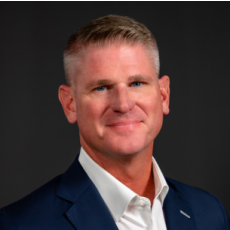Forward Air (NASDAQ: FWRD) is a leader in the global air and ocean freight forwarding and expedited ground transportation industry in North America.
Having served in the military, United States Navy, could you share some of the guiding principles that you follow?
One principle I live by is, "Success is not owned; it is rented, and the rent is due every day." This is a key leadership mantra for me, and it serves as a daily reminder to stay humble and focused. Trust is another cornerstone of my approach. In the military, trust is paramount—it is the foundation of every mission. Performance can vary, but trust cannot. It is unwavering. At Forward, we focus on building that trust at all levels because, in logistics, as in the Navy, lives and livelihoods rely on it. It is crucial to respect people up and down the organization and to be consistent in how you treat others. This consistency builds a solid foundation for our team and contributes to creating a respectful, high-performing, hard-working culture.
Could you explain the role of expedited less-than-truckload (LTL) freight within the logistics industry and its value to customers?
Expedited LTL is essentially the difference between regular and express transport. Traditional LTL takes longer and can be unpredictable, with deliveries often occurring over a 5-10-day window, moving only when trucks are fully loaded. In contrast, expedited LTL operates like a city’s metro bus. It departs on schedule, at the same, time, every time, whether the truck is full or not. This model allows for faster, more reliable delivery, which is essential for customers who need their products in the market on a time-sensitive basis. For companies relying on speed, particularly in international contexts, expedited LTL fills a critical need. It helps transport products quickly from deconsolidation points to their next destination without compromising the goods’ quality.
With the rise of AI and semiconductor reindustrialization, is Forward Air working with high-tech manufacturers?
Yes. We work with many chip manufacturers and tangential manufacturing concerns. One of our largest customers is NVIDIA. Beyond just chips, we support high-tech sectors across various fields, including telecommunications and computing. Our focus is to meet the unique demands of tech giants and adapt as they shift their production models.
The timely delivery of high-value products around the world, especially in the tech sector, is essential as demand and timely solution needs continue to grow. Working with high-end clients like NVIDIA requires us to provide an incredibly consistent, timely, and exacting service; otherwise, we would not secure their business. This commitment to precision is part of our strategy, especially as we support the evolving logistics needs of a global economy.
Given the need for speed in delivery, has there been a geographical shift in where distribution centers are being based?
We support our customers’ logistics needs wherever they may be located. Whether it is Asia, Europe or North America, we provide a solution that meets the needs of an ever-evolving and dynamic global marketplace. Traditionally, many companies opted for a bi-coastal distribution model. However, some clients now see value in adding a central distribution center to reduce transit times across the U.S. and other geographies. This approach enhances flexibility, reduces costs, and ensures faster delivery, meeting today’s high consumer expectations. We align our offerings to best serve these changing patterns. As demand shifts, so does our approach, evolving from the simplicity of expedited services to a more comprehensive array of support across international freight, warehousing, customs clearance, and contract logistics. The goal is to be the top choice among a small, trusted group of logistics providers, helping our clients meet their distribution goals reliably and efficiently.
What impact has the growth of e-commerce had on the logistics ecosystem?
The e-commerce boom, accelerated by the pandemic, has fundamentally changed logistics. The pandemic pushed consumers and businesses alike to rely on online shopping, shortening the acceptable wait time for deliveries. This has led companies to focus on establishing distribution centers close to densely populated areas, where same-day delivery has become a competitive advantage. We are seeing an increase in smaller, more strategically located distribution hubs, which are essential for rapid delivery in high-demand areas. I have observed this shift firsthand, as companies with previously centralized logistics models have moved toward regional hubs to cater to consumer expectations.
With data becoming increasingly integral to logistics, how is Forward Air managing data security and innovation amid increasing operational complexity?
Data integrity and cybersecurity should be a priority for everyone, and it certainly is for us. As part of our aggressive security posture, we conduct rigorous audits and utilize world-renowned outside advisors to regularly test the security of our systems. This proactive stance ensures data protection and operational resilience as we scale. We operate a centralized data lake, which allows for seamless data access and enables us to leverage advanced capabilities like machine learning (ML). Having a single source of truth for key business data is foundational to keeping our data and processes consistent, which is critical to the speedy integration of multiple systems.
What are your main concerns when considering the vast scale of Forward Air’s operations?
The safety and security of our employees and the goods we transport are my primary concerns. Every day our 3,600 trucks and 7,000 employees worldwide are moving valuable goods, and safety is non-negotiable—accidents in our line of work are serious, so we prioritize safe and secure operations. We take extensive precautions to ensure our teams have the resources and training necessary to maintain safety standards. In this industry, we are responsible for protecting both people and cargo, and that responsibility is one that I take very seriously and to heart.
What mode of transportation do you see as pivotal for U.S. logistics in the coming years?
In the U.S., trucking remains essential and will likely continue to dominate, especially with increasing demand for faster delivery. Post-9/11 changes and the shift toward narrower-body domestic flights have only amplified the importance of expedited trucking for moving goods across the country. Our expedited trucking network, covering coast-to-coast routes within 3-3.5 days, supports this critical need. This trend will persist as “friend-shoring” gains traction, particularly with Mexico’s growing role in U.S. supply chains. With infrastructure improvements, such as the new Columbia Laredo Bridge, the connection between Mexico and the U.S. is set to become a major trade corridor. These developments in regional logistics align well with our focus on trucking as a reliable, adaptable transportation mode for both domestic and international markets.
Are you exploring autonomous trucking as part of Forward Air’s future, given the potential for increased efficiency?
We are keeping a close eye on autonomous technology, which has clear benefits for safety and efficiency in logistics. Autonomous vehicles can respond faster than human drivers and enhance safety. However, I foresee autonomous trucks with drivers present for emergencies rather than completely driverless trucks in the near term. While middle-mile operations could be autonomous, hands-on assistance is still necessary for tasks like hooking up trailers and navigating entry points.
What milestones are you focused on as Forward Air moves forward?
Following our recent acquisition of Omni Logistics, we are focused on integrating and transforming the combined companies into a unified, global, high-performing organization. Both companies have a reputation for excellent customer service, and now we are working to leverage that strength across a combined team of 7,000 associates. Having recruited some of the industry’s leading minds and using cutting-edge technologies, our mission is to set the standard for excellence in logistics, whether through data quality, customer service, or operational efficiency. But while technology plays a significant role, our business remains fundamentally about people. I am proud of the talent we have and the collaborative spirit that is driving us forward. We are committed to making our company a benchmark for excellence in the industry, and I am honored to lead such a dedicated and talented team on this journey.





